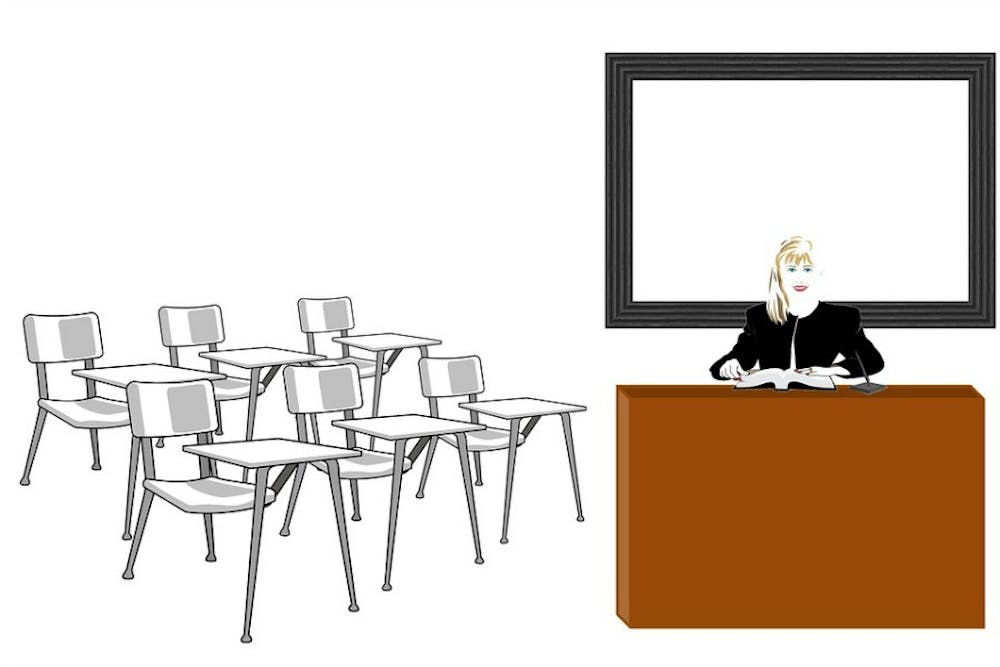Tenure system key to quality, AAUP says
By Megan Zahneis, News Editor
Full-time tenured faculty numbers are down 26 percent in the past 40 years, and the number full-time tenure-track faculty has diminished by half, according to an annual report released Monday by the American Association of University Professors (AAUP).
The 14-page "Annual Report on the Economic Status of the Profession, 2015-16: Higher Education at a Crossroads" outlines the trends in academic workforce composition and suggests several methods of achieving a more equitable balance.
The author of the report, Washington D.C.-based AAUP senior researcher John Barnshaw, said restoring the tenure system to its former glory is key to revitalizing higher education.
"The tenure system protects academic freedom, facilitates shared governance, spurs pedagogical and research innovation, and bolsters student learning and retention rates," Barnshaw wrote.
In an interview, Barnshaw said students may not realize the impact that an increasing reliance on non-tenured faculty could be having on their education.
"There's some pretty good research to indicate that faculty that are full-time, tenure-track really could help students in gateway courses - those introductory course, 100-, 200- level courses - as well as help … with student retention and success," Barnshaw said "All of those things are very important for student outcomes, as well as for colleges and universities overall, as well as the academic labor force and the larger labor force once those students graduate."
AAUP data also suggest a correlation between classroom activity and the greater academic freedom granted to tenured professors. From a sample of over 2,200 faculty members nationwide, full-timers were 10 percent more likely than their non-tenured colleagues to experiment with teaching methods, 10 percent more likely to experiment with their course content and 8 percent more likely to teach material that "might challenge students' understanding of their social world."
It's a phenomenon Cathy Wagner, a tenured professor of English and vice president of Miami's AAUP advocacy chapter, has experienced firsthand.
"Any professor who gets tenure will have had the strange experience of realizing that they are a bit freer than they were before, even if they didn't realize it," Wagner said. "That certainly was the case for me … I changed my teaching when I became tenured. I started experimenting more."
Wagner, like Barnshaw, considers tenure a vital cog in the academic ecosystem.
"The tenure-line folks are the ones who are doing the research and generating knowledge and passing that knowledge directly to students," Wagner explained. "We are supposed to be thinking and doing research, and we need to be able to do it without a sense that we will be wasting our jobs if we say something unpopular or if we research something unpopular.
"It's really essential for academic freedom, I think, and for freedom of speech, freedom of thought."
But, Barnshaw said, tenured positions are being undermined for budgetary reasons, stemming from recent cuts in state appropriations. A generation ago, state appropriations comprised about 30 percent of a university's expenditures. Now, that number has dwindled to 11 or 12 percent.
Spending on instruction, according to the AAUP report, comprises less than one-third of a university's budget. Academic support and student services make up an additional 14 percent, and research accounts for only 9 percent of the average budget.
Thus, tenure and tenure-track faculty make up a diminishing portion of university payrolls, and according to Barnshaw's report, students suffer, perhaps unwittingly.
The problem Wagner and Barnshaw see is an institutional one, compounded over nearly half a century, but not an intractable one.
"If the students and parents understand that we could be using our resources differently, and that the university could be better supported, then I think that pressure will push up on the administration, and then push upward onto the Board of Trustees, and then that will push upward eventually onto the state level and to the legislation," Wagner said.
Yet Wagner and Barnshaw expressed optimism that the report could inform change.
"Hopefully it can help raise awareness that universities really have been terribly starved and forced into a kind of marketing-oriented behavior that diverts from the educational mission, [where] we're really more about finding students to come here than we are about teaching them once they're here," Wagner said.
If not, the consequences could prove dire for would-be students.
"If it keeps on going like it is," Wagner said, "then we're looking at a situation where education is going to be increasingly unequal and people who can't afford to take out state loans won't be able to go to someplace like Miami at all."

